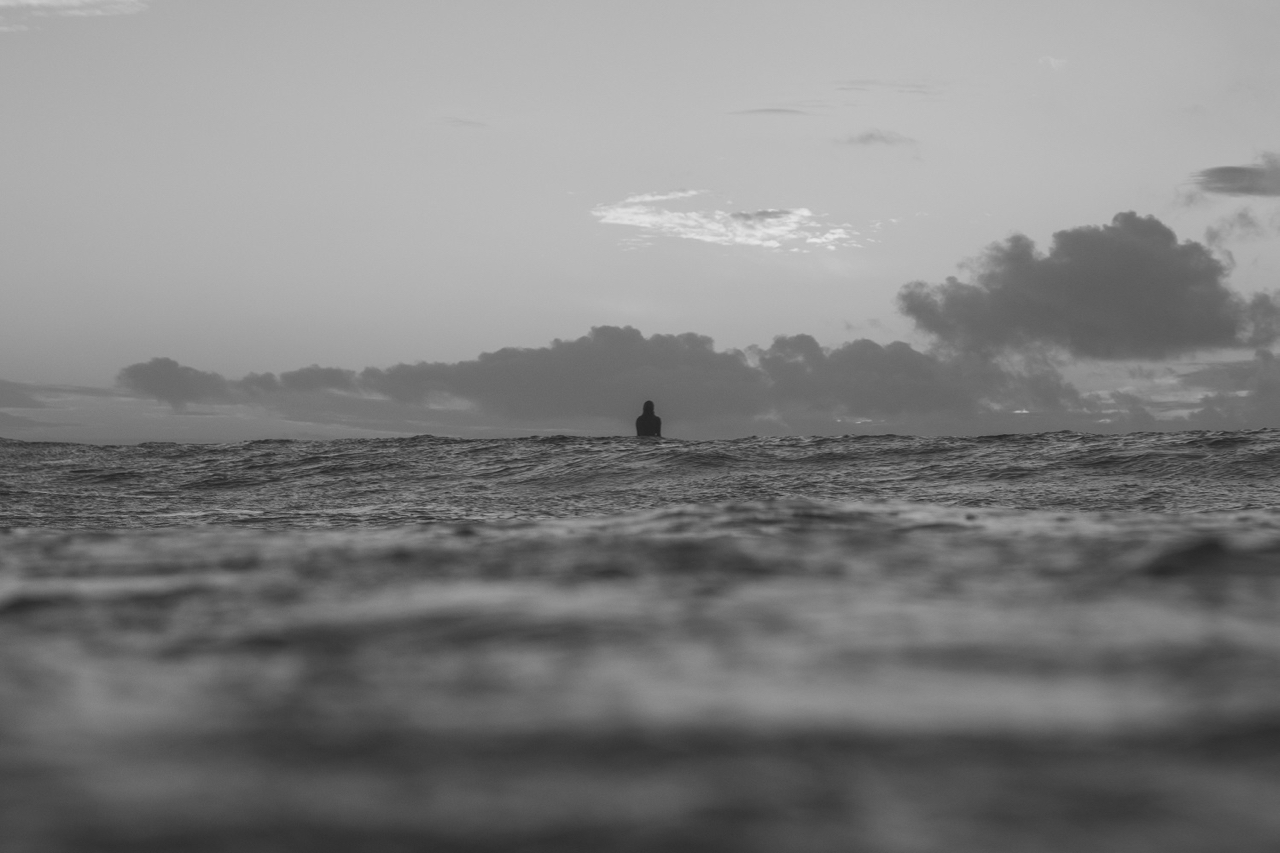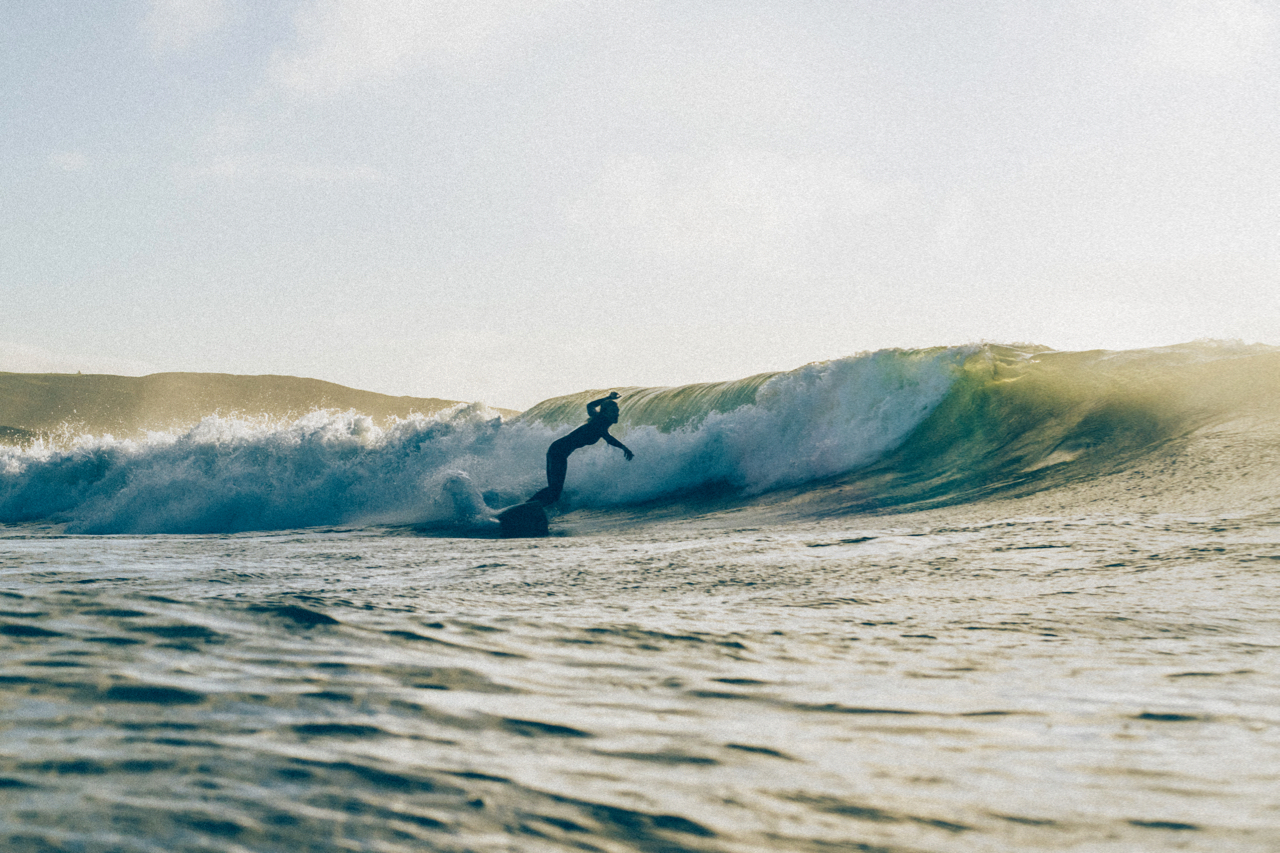WHY I: SOPHIE HELLYER
Sophie Hellyer is a woman on a mission. The Westward Ho!, Devon raised surfer has been the poster child for British surfing during her career as a competitive athlete, contracts with global-leading surf brands, magazine covers and competition wins making for an illustrious career that has seen Sophie raise the profile of Britain’s surf industry and been a well-known, and liked, face of it.
But it’s Sophie’s work post-surfing career that has been stoking embers of positive change. Passion projects causing ripples, nay, surges, within the traditional notions of surf culture, sexism, feminism, environmentalism and more. Her seeringly honest and candid style of writing cuts to the chase, prompting wider conversation with change and impact.
Settle down for a read with the charging force of change, Sophie Hellyer.
Sophie Hellyer’s career since turning pro as a surfer more than 15 years ago started with a typical trajectory. A talented surfer travelling the world, popping up regularly in campaigns and covers, a blue eyed, blonde-haired image of a female surfing pro we are typically familiar with. During this writer’s time working full time for a popular women’s surfing magazine, Sophie was a familiar face within our pages, her notable talents as a surfer paired with an honest interest in the world around her making for a popular read with our audience.
Fast forward to 2018, and Sophie has been boldly questioning, quashing, even attacking traditional (sometimes damaging) perceptions of not just women within surfing, but our larger impact on the world around us, and what it means for our environments and more. A prominent broadsheet’s misquoted article (entitled “Surf Star Sophie Hellyer Lets Rip At Bikini Sexism” published earlier this spring) seemingly poured gasoline over already crackling embers. Sophie’s work since then has prominently appeared on widely read global platforms and broadsheets including The Independent and The Inertia, discussing topics which have been glaringly obvious and often taboo within the world of surf and sport culture, and on a wider platform, of sexism & feminism.
The media squall ensuing the well-publicized misquoted article led to, Sophie explores, “two key positives. It opened me up to new platforms. I had the opportunity to go on BBC’s Women’s Hour on Radio 4, and I wrote my first piece for The Independent (I’ve had 3 or 4 pieces published with them now).” Furthermore, she adds, a critical positive impact was “it really challenged me to grow and understand a lot more about intersectionalfeminism…Yes, the gender pay gap between men and women is large, but if you look at the pay gap between white women and women of colour, that’s also quite large. So I’ve had to learn a lot more and understand my position and my privileges a lot more, it’s been great.”
“I understand now that there’s so much more work that needs to be done, and me, as a privileged white woman, needs to do my piece and step-up and take responsibility”.
It’s that deeper look at the root causes, at the more fundamental issues at play and how exactly change can be implemented which is seeing Sophie’s status rise as an authentic voice and champion within her respected topic areas. “I have been writing about everything from gender disparity, periods, to wanking (ha-ha)…and social injustices that need to be addressed. I’m in a position that I can speak up about and kind of, make some changes. I think that so much stuff that is taboo needs to be normalised. I’ve posted things like my sexual health check-ups. I’m a woman, I have sex. I think it’s important.”
“Stuff like that needs to be normalised. Nearly every time I meet someone I’ll openly say in a conversation I have therapy…There’s a shame and a stigma attached to having counselling, and I think every single person I know ends up having some kind of therapy. Mental health is really something that needs to be talked about as well.”
Tracing the path to this progressive nature of her work when Sophie left Australia where she was based, moving to an organic-farm in Ireland, growing her own for 4 years where she explores “I guess I became more aware of things…I really started becoming aware of plastic issues and then obviously growing my own food and living on an organic farm, environmental awareness just sky rocketed. Because of that I said to my sponsors that I was only going to travel by land and sea to shoots…
The resulting consequence of that was that I would only surf in a wetsuit for photos, because it’s ridiculous that we’re only ever modelling in bikinis anyway. We don’t wear bikinis in the UK and Ireland (to surf).”
Sophie ripping
Whilst in Ireland too, a deeper look into surf culture whilst attending the Irish Surf Film Festival (“A great event, the organisers are amazing”) Sophie was shocked to see that “in the shorts, out of all the shorts entered, there wasn’t a single film made by a woman. No female directors, no female film makers, there’s no film about a woman, and out of all the waves ridden in all of the shorts there was only one wave ridden by a woman. Whereas actually, there's a lot of women surfing Ireland, surfing well…”. Fiery editorial and work since has championed the need for more of these stories, for more of these women to be represented and shown in the wider media.
With Sophie’s work published on some of the world’s largest surf-culture media outlets, she admits, “putting it out to the masses is dangerous”. The double-edged sword of having a wider audience, yet the dangers of being exposed to trolling and worse, comes hand in hand with working as a writer and having your work published on the digital-sphere. Sophie begins “I really try to not react to things… most people who say something negative I try engage in a conversation.
Having strong opinions on something is for me the interesting part. How you got to that, what was your thought process, I want to understand why you think like that.”
“I want to understand the process of how you got there, and then maybe we can meet in the middle somewhere. Maybe you’ll change my mind, maybe I’ll change your mind.”
This refreshing outlook is understandably, gaining Sophie a loyal legion of readers tuning into her work. If those questioning whether or not stimulating conversation and voicing an alternative view can have impact and make change, only have to look at the recent case of an image that went viral of a male and female athlete on the podium of a surf competition. The gross disparity between their winning pay checks starkly apparent, with 50% less earnings for the female champion. The backlash from that powerful image was immediate, such can be the power of the internet and social media. Sophie agrees, adding “obviously, the public saw the issue and it was widely shared and discussed, and there have been some changes. The sponsor steps in and says we will match it and only sponsor events with equal prize for equal title, change, boom, done, so I think we’re seeing change much more quickly now, with the speed of social media.”.
And now, just last week, we have seen monumental change within the surfing industry. Not only being the first sport to announce equal pay for its male and female athletes in WSL (World Surf League) controlled events, the viral announcement has sent positive shockwaves within the global sporting landscape, a clear indication of the powerful precedent that discussion, that relentless drive can yield. Sophie agrees, asserting that “
“The WSL’s U-turn decision the pay parity is massively down to the tireless activism of CEWS (Committee of Equity in Women’s Surfing), Bianca (Valenti), Keala (Kennelly), Andrea (Mollre)…huge respect for them for their continued bravery and voices”.
It is an incredibly encouraging development, considering that sexism has, unfortunately, been tied closely to the surf industry. It is a contentious subject within the realms of pro-surfing. Looking past the pay gap issues which now, the WSL has made incredible moves to close, we still see within female surfing destructive stereotypes of female suffers which cause critical ramifications for the athletes making a living from the sport.
A cookie-cutter image of what a female surfer has been portrayed and conveyed in media, on billboards, within films and more, has typically showcased a more lithe, blond and blue-eyed surfer. If we get into the nitty gritty, following the recent cases of talented pros, Brazilian charger Silvana Lima (if you haven’t seen Silvana surf, haul yourself over to YouTube now) and Australian world –tour surfer Rebecca Woods, who spoke out, explaining that it cost her “thirty grand a year to be on tour. She couldn’t find a sponsor because sponsors were choosing the girls who fit their marketing campaigns best, so choosing the girls who looked like models, who then got knocked out the comps in the early rounds, as opposed to sponsoring the girls who are actually incredibly good athletes”.
I ask if we are still seeing this kind of behaviour in 2018 from brands within surfing? “The only women who are finding real success surfing are the women who fit this kind of commodified mono culture industry’s beauty ideal. I’m not saying these women shouldn’t have success. They should be respected as surfers and celebrated as athletes.”
“What would be nice to see is the same levels of success for women who don’t necessarily conform or fit in the box of being a beautiful, thin, white, blond surfer. It would be nice to see success for a wider, and more diverse group of women, and then become role models for the younger generation”.
Delving into the core of why and who is making these decisions that continues to perpetuate stereotypes about female surfers which are actually, damaging to those athletes who make a living from the sport, Sophie suggests that”
“Most of those big brands are run by men…sex sells sex, not sport, that’s proven. When you see these images of hyper sexualised women, actually studies show that it makes us question their sporting ability, and we actually doubt if they are any good at their sport. Are the brands trying to sell surfing, or are they trying to sell sex?”
Sophie does also contend that, “I guess we have to acknowledge that a lot of women are implicit in sexism, there are lots of women in marketing in these companies”. Arguing that it is the decision makers, those pulling the reigns behind the scenes, she continues “the brands are normally run by men…and the media is mostly run by men, the sports stories in the news are mostly written by men. I think it’s something like 8% of sports stories are written by women.” To even out the playing field and be able to critically see, more women a fairer representation of female athletes in the media, Sophie suggest that “you see change happens when you…put a woman in there. The first piece I wrote, I had in Wavelength about the under representation of female surfers in wetsuits. That piece got commissioned because Holly Bendall was working at Wavelength at the time, she was a woman at the magazine and she commissioned it”.
Critically now, we are seeing positive impact from independent brands that are championing a wider and more inclusive view of what it is to be a female surfer, namely, just have a board under your feet, regardless of size, hair colour, skin colour and more. Sophie is excited to see that “we are seeing body diversity, a complete different range of women being represented, and always doing sport, because they are trying to sell sport, not sex… Change is happening, and I think the change happens when women own the position to make the change, they do.”
To further instigate critical change needed, Sophie suggests that “transparency from brands is huge for consumers. I think as the consumer, we have more control, and power than ever. There’s an amazing quote, every time you spend money, you’re taking a vote on what kind of society you want to live in. Not everyone is financially able, so there are brands out there that are cheap and that’s brilliant because it makes it accessible for people in low income families…if you have the income and you’re able there’s a responsibility to shop wisely, and for ethical and indie brands.”
When not pouring her energies into her work, Sophie can be found regularly bracing the chilly British waters for her near daily wild-swim, a hobby that started in Ireland, but then gave birth to #RiseFierce, inviting other women to reap the benefits of a wild-swim.
“It’s kind of like a body positive who gives a shit what you look like, get in the water and stick two fingers to the man!”
I ask Sophie if there is anything she would say to her 15-year-old self? “Stay true to yourself and stand up for yourself, because a lot of the time I went along with… I knew… I was getting more opportunities because of the way I looked and that was the norm, I went along with it and I never spoke out against it… I ended up posing more seductively than I ever felt comfortable…You just go along with it, because that person appears to have authority over you. So I would definitely like to tell myself that, just be a little bit stronger, and stand up for yourself, rise up, ha-ha”.
Stay tuned for more from Sophie Hellyer, something tells me, this is just the beginning.
Read more of Sophie’s work here
Follow Sophie on Instagram here















